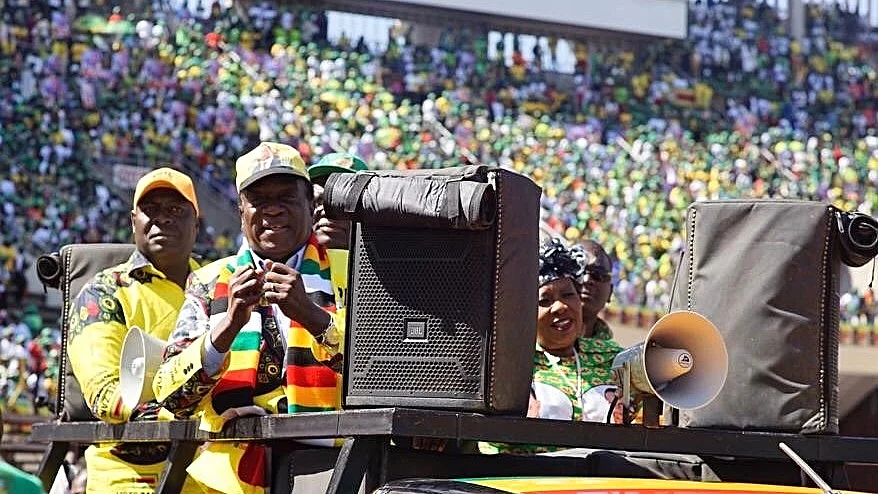ZANU-PF’s Emmerson Mnangagwa wins Zimbabwe presidential election
Zimbabwe’s electoral commission declared Emmerson Mnangagwa president, with 50.8% of the vote. However, Opposition protesters have accused the ruling party of trying to rig the election

Zimbabwe’s electoral commission announced the presidential election results province by province late on Thursday, August 2 night and declared Zanu-PF’s Emmerson Mnangagwa president shortly after midnight, with 2.46 million votes against 2.15 million for his rival Nelson Chamisa.
Mnangagwa led Chamisa by some 2,30,000 votes after nine of the ten provinces had been declared. Mnangagwa had 53% or 2.15 million votes counted over Chamisa's 47% or 1.92 million votes.
After the first four of ten provincial results, Chamisa's opposition Movement for Democratic Change (MDC) had a lead of about 50,000 votes over the ruling ZANU-PF but after the fifth province was announced, the lead had switched to Mnangagwa.
When the final province was reported, Mnangagwa's share of the vote was declared at 50.8% by the electoral commission. When the final province was reported, Mnangagwa's share of the vote was declared at 50.8% by the electoral commission.
Chamisa's share was 44.3% of the total vote.
To become president, a candidate has to take more than 50% of the vote. Chamisa did well in urban areas but Mnangagwa outperformed him in rural zones.
The announcement came after clashes between opposition protesters and soldiers in Harare left at least six people dead. The unrest marred what had been billed as an important milestone in Zimbabwe's efforts to return to democracy following 37 years of repression under longtime leader Robert Mugabe.
Chamisa said police raided opposition headquarters in Harare and seized computers. The search warrant indicated they were looking for unlicenced firearms, grenades and stones. Police said 16 people in the offices were arrested.
Results announced by the electoral commission
- Mnangagwa was declared president with 50.8% of the vote to Chamisa's 44.3%.
- The ruling ZANU-PF party won 144 of the 210 seats in parliament—a two-thirds majority that enables it to change the constitution.
- The opposition Movement for Democratic Change (MDC) took 61 seats.
- The electoral commission was yet to announce three undeclared seats.
Call for calm: Zimbabweans told “peace is paramount”
Emmerson Mnangagwa called for an independent investigation into the deadly unrest in Harare and said that he had spoken with opposition leader Nelson Chamisa to try to defuse tension.
"We must maintain this dialogue in order to protect the peace we hold dear," he wrote Thursday on Twitter. "Together we must lead by example and show all Zimbabweans that peace is paramount."
Late Wednesday, Chamisa, 40, said the presidential results were bound to be fraudulent, telling his supporters: "We have won this one together. No amount of results manipulation will alter your will."
Elmar Brok, chief observer for the EU's election monitor mission in Zimbabwe, told DW that the vote was marred by a "lot of shortcomings in favor of the ruling party," including through "financing, state media, intimidation, especially in the countryside."
Zimbabwe Electoral Commission chairwoman Priscilla Chigumba denied allegations of bias and strongly disputed accusations of rigging.
Post-Mugabe vote
This week's elections were seen as an important step in Zimbabwe's efforts to break with the repressive rule of Robert Mugabe, who was ousted from power last year. Despite reports that the vote had gone off peacefully, international observers voiced concerns about irregularities and a lack of trust in the polling process. Officials also criticized the delay in announcing the results of the presidential race, saying it had undermined the vote's credibility.
There is now the challenging task of uniting the country and reviving an economy that's been badly battered after years of international isolation.
Under former President Robert Mugabe, 94, the country went from being a prosperous economy to a pariah state wrecked by mismanagement and corruption. Elections during his rule were largely marked by repression and fraud allegations. His successor, Emmerson Mnangagwa, had promised a free and fair vote, inviting EU observers for the first time since 2002.
Who is Emmerson Mnangagwa?
Mugabe's former deputy president and right-hand man was the clear favorite to win the presidential race. Sometimes dubbed "the crocodile" for his ruthlessness during his years as Mugabe's state security chief, Mnangagwa has tried to cast himself as a forward-looking reformer. Following independence in 1980, he allegedly was partially responsible for a brutal crackdown on opposition supporters that claimed thousands of lives in Matabeleland. The ZANU-PF veteran was also allegedly involved in deadly violence against the opposition during the 2008 elections.
Follow us on: Facebook, Twitter, Google News, Instagram
Join our official telegram channel (@nationalherald) and stay updated with the latest headlines